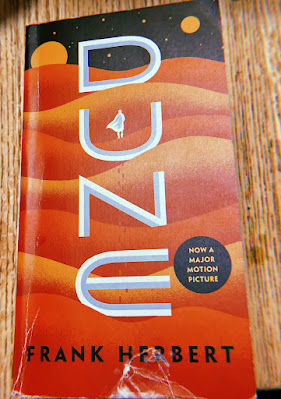The Greatest Epic in Science Fiction? | A Review of Dune by Frank Herbert
I was first introduced to Dune in 2021 when I watched the film directed by Denis Villeneuve. A longtime lover of science fiction, I found myself immediately entranced by the fictional world of Arrakis that came of life onscreen. After watching the film, I vowed that I would one day read the book that inspired the movie, despite the infamously complex nature of the text.
In the lead-up to the release of Dune: Part Two, I decided to finally read the novel originally penned by Frank Herbert in 1965. I had been warned many times that Dune was a beast of a book that spanned close to 800 pages (making it by far the longest book I have ever read) and also required referencing appendixes, glossaries, and maps included in the novel.
While Dune is by no means an easy read, I did not find it to be any more challenging than Tolkien's Lord of the Rings or other more complicated pieces of classic literature that I've encountered in the past. Admittedly, I was not always 100% certain of what was happening or being discussed in every scene, but as I kept reading I was eventually able to piece together various elements to a level of nearly full comprehension.
Would I recommend Dune to anyone and everyone? Most certainly not. But for those who like me are lovers of science fiction, I would argue that Frank Herbert's magnum opus is required reading.
Dune follows the story of Paul Atreides, a boy born into nobility who is forced to relocate to the hostile desert planet of Arrakis. After tragedy strikes Paul and his family, he unintentionally embarks on an epic journey to becoming the messianic leader of the native population of the planet, the Fremen.
The world-building in Herbert's Dune is some of the most impressive I've ever encountered. Entire planets, societies, ecologies, and cultures are described in-depth, which certainly contributes to the lengthy nature of the book but also its richness. The universe of Dune is seemingly familiar, borrowing from languages like Arabic and Hebrew, major religions like Christianity and Islam, and social-structures like the merchant houses of the Middle Ages. Simultaneously however Hebert also presents an enchanting and entirely-new reality that demonstrates the abundance of human imagination.
Setting aside, Dune touches on a number of meaningful themes and topics, ranging from politics and environmentalism, to religion and the pursuit of self-actualization. Though published nearly 60 years ago, the book contains many messages that carry relevancy to this day.
Without giving away too much of the plot, the development of Paul Atreides as a character reveals the danger in marrying politics and religion, as well as the power of these two forces in uniting individuals--for better and for worse.
Beyond that however, Dune provides a powerful commentary on human agency. The ambitions of Paul, the Fremen, and other actors in the universe encapsulate the timeless struggle of individuals and societies to reshape their circumstances and realities. Characters battle against forces both physical and intangible, and while some pursuits are nobler than others, one comes to empathize with the deeply human desire to be the master of one's own life and world around them.
Herbert's Dune is a masterpiece of epic proportions, and I eagerly look forward to reading the next book in this legendary series.


Comments
Post a Comment